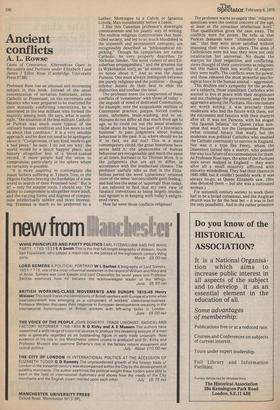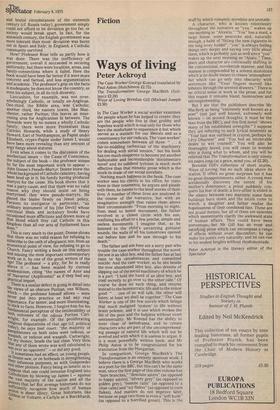Ancient conflicts
A. L. Rowse
Cases of Conscience. Alternatives Open to Recusants and Puritans under Elizabeth I and James I Elliot Rose (Cambridge University Press E7.00) Professor Rose has an unusual and interesting subject in this book. Instead of the usual concentration of sectarian historians, either Catholic or Protestant, on the extremists and fanatics who were prepared to be martyred for their mutually conflicting convictions, he is interested in the less militant who formed the majority among both. He says, what is surely right, "the situation of the less militant Catholic or Puritan was much more typical of the ordinary human condition and has more to tell us about that condition." It is a very sensible approach, and he does not need to be apologetic about it. "Compromise, of any kind, tends to get a bad press," he says. I do not see why; the world would be a much happier place, and history altogether less of a blood-soaked record, if more people had the sense to compromise, particularly in the sphere where no certainty is possible.
"It is more inspiring to contemplate the Jesuit fathers suffering at Tyburn Tree, or the Pilgrim Fathers braving the hardships of a new world in search of their Promised land." But is it? — only for simpler souls, I should say. The ability to compromise is altogether more adult, and the varying forms and degrees of compromise intellectually subtler and more interesting. Erasmus is much to be preferred to a Luther; Montaigne to a Calvin or Ignatius Loyola; Mao considerably before a Lenin. I like this Canadian professor's downright commonsense and his jaunty way of writing. The endless religious controversies that bedevilled society, and led to so much bloodshed in the sixteenth and seventeenth centuries, are recognisably described as "philosophical nitpicking." Though his sympathies are rather Catholic, he very properly describes Dr Nicholas Sander, "the most violent of anti-Elizabethan propagandists," and the greatest liar (a Vvykehamist too!), as "an enemy agent, and no bones about it." And so was the Jesuit Parsons. One must always distinguish between the purely religious and the politicos — though inferior Jesuits do their best to elide the distinction and confuse the issue.
The professor notes the comparison of these conflicts of 'conscience' with those of today — the anguish of mind of dedicated Communists, for example, over the unspeakable realities of Communist practice, purges, forced confessions, informers, brain-washing, and so on. Humans do not differ all that much from age to age, so he could cut out the usual academic cliché about its being "no part of a historian's business" to pass judgments about human behaviour in the past. It is; where should we be if, in fact, we did not? This is a mere contemporary cliché, the great historians have never held it; the phenomena of human behaviour are recognisable and much the same at all times, Socrates or Sir Thomas More. It is the judgments that are apt to differ, in accordance with the intellectual climate. The professor usefully tells us that in the Elizabethan period the word 'conscience' retained more of the sense 'uncontrollable guilt-feeling,' and had less the sense of 'superego' than today. I am relieved to find that my own view of fanatics' convictions as being largely intellectual egoism is in keeping with today's enlightened views.
How far were those conflicts religious? The professor warns us sagely that "religious questions were the central concern of the age, at least at the conscious intellectual level." That qualification gives the case away. The conflicts were for power. He tells us that Puritan demands were "ultimately totalitarian," that they were never satisfied without imposing their views on others. The aims of Catholicism were not less: they were not only totalitarian but universal. No doubt the martyrs for their respective, and conflicting, views thought of their convictions as religious; but this makes them less worthy of respect: they were muffs. The conflicts were for power, and these released the most powerful psychological force in the human animal — aggression.
This doubles one's sympathy for the professor's subjects, those unmilitant Catholics who wanted to live in peace with their neighbours and not challenge the government, and the less aggressive among the Puritans. His conclusions are worth noting: it was precisely these moderates who had the future with them, not the extremists and fanatics with their martyrs after all. It was not Parsons, with his slogan "the Spanish Infanta" for Queen (what nonsense that was!), nor the Gunpowder Plotters (what criminal lunacy that was!), but the moderate non-political Catholics who enabled the Catholic community to survive in England. Nor was it a type like Penry, whom the Dissenters turned into a martyr, who pointed the way to a future of accommodation for them. As Professor Rose says, the aims of the Puritans were never realised in England — they were after all a small minority afflicted with minority-mindedness. They had their chance in 1640-1660, but it couldn't possibly work: it was always no-go, as Queen Elizabeth saw. (She also detested them — but she was a cultivated woman.) For sixteenth century society to work there had to be a broad consensus, and the Anglican church was by far the best bet — it was in fact the only possibility. And in the rather primitive and brutal circumstances of the sixteenth century (cf. Russia today), government simply could not afford to let deviation go too far, or society would break apart. In fact, for the sixteenth century, the English government was more tolerant than most: deviation was burnt out in Spain and Italy; in England, a Catholic community survived.
How? Professor Rose tells us partly how it was done. There was the inefficiency of government; overall it succeeded in securing uniformity, but there were localities, areas, and family-connections where it failed. Here the book would have been far better if it were more concrete and factual, and less argumentative and academic. The professor's grip on the facts IS inadequate; he does not know the country, or even his subject, in all its rich diversity. Lancashire, for example, was not overwhelmingly Catholic, or totally un-Anglican. One-third, the Ribble area, was Catholic; another third, the eastern towns, like Manchester, rather Puritan; this leaves an inter vening area for Anglicanism in between. The Howards were by no means a wholly Catholic family; there were more Protestant than Catholic Howards, while a study of Henry Howard, Earl of Northampton, as Papist under Elizabeth, crypto-Papist under James I, would have been more revealing than any amount of argy-bargy about statutes. Even when it comes to the discussion of the intellectual issues — the Cases of Conscience, the subject of the book — the professor misses by far the most important work to appear — John Donne's Pseudo-Martyr. Donne knew the Whole background of Catholic casuistry, having been bred up in it, his family having produced martyrs for the cause. His book shows that it was a party-cause, and that there was no valid reason why they should insist on being Martyrised: they were pseudo-martyrs. He ' Placed the blame firmly on Jesuit policy, Parsons its instigator in particular, "an ordinary instrument of his [the Devil] whose continual libels and incitatory books have occasioned more afflictions and drawn more of that blood which they call Catholic in this kingdom than all our acts of Parliament have done."
This is very much to the point; Donne shows that there was no valid reason for refusing to subscribe to the oath of allegiance; nor, from an
ecumenical point of view, for refusing to go to Church. Fancy writing a book on this subject and missing the most important contemporary
Work on it, by one of the great writers of the age! The professor — a pity, for he is really
above it — has been misled by current academicism, citing "the names of Azor and of eNavarrus' (Azpilcueta)" as if they had any Practical import.
, There is a similar defect in going in detail into lbe views of an obscure Puritan, one Wiburn, Which — the professor himself allows — were !lever put into practice or had any real IMPertance. Far better, and more illuminating,
flo stick to facts. However, I forgive him for his kti_ndamental perception of the intolerability of 'uth extremes of the odious Puritan ' Cartwtight, for example. Of the proliferating treligious disputations of that age (cf. political ,°daY), he says tout court: "the majority of "waMPhIeteers on both sides were tedious, or fr,asPisn, or tedious and waspish. Cartwright, tii` MY money, heads the last class. Very little N4t any of them wrote was well calculated to
"` Over an opponent" — or did any good. It as sometimes had an effect, on young people, onne saw, or on hotheads in strengthening Lnei infamous purposes, as with Gunpowder
;rid other plotters. Fancy being so lunatic as to jIPPose that one could terrorise England into vatholicism by blowing up James I — against vast majority of the nation and all the sPorwrers that be! But average historians do not aucti,lciently recognise how much of human Gik"-41 is sheer idiocy. Great historians, like do'. bon or Voltaire, a Carlyle or a Burckhardt,



































 Previous page
Previous page